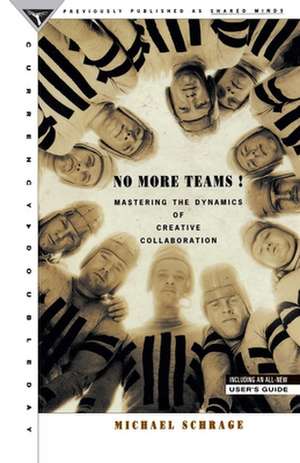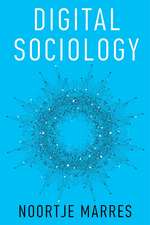No More Teams
Autor Michael Schrage, SCHRAGEen Limba Engleză Paperback – 31 mar 1995
Preț: 111.99 lei
Nou
Puncte Express: 168
Preț estimativ în valută:
21.43€ • 22.25$ • 17.87£
21.43€ • 22.25$ • 17.87£
Carte tipărită la comandă
Livrare economică 24 martie-07 aprilie
Preluare comenzi: 021 569.72.76
Specificații
ISBN-13: 9780385476034
ISBN-10: 0385476035
Pagini: 272
Dimensiuni: 139 x 220 x 17 mm
Greutate: 0.35 kg
Ediția:Currency Paperb.
Editura: Crown Business
ISBN-10: 0385476035
Pagini: 272
Dimensiuni: 139 x 220 x 17 mm
Greutate: 0.35 kg
Ediția:Currency Paperb.
Editura: Crown Business
Extras
Introduction: No More Teams!--An Organizational Manifesto
Why don*t teams make sense? What could possibly be wrong with more and better teamwork? In an ideal world, absolutely nothing. But we don't live in an ideal world: we live in this one.
At a job interview, a friend was asked if he was a "team player."
"Yes," he replied, "team captain." That story--which happens to be true--invariably gets a good laugh. But it is a cynical and knowing laugh. Everyone in the room understands precisely what most organizations mean by "team players."
Quite simply, the word team has been so politicized, so ensnared in the pathology of the organization, that we don't really know what it means anymore. Is a team a medium to manage value? Or a mechanism to play politics? It's easy to answer "Both." Of course, in that case, a team means whatever the organization wants it to mean. Which means, of course, that it has no real meaning at all. It is, however, the popular management metaphor of the moment. But is it the right metaphor? Is it a metaphor we should be building-- and rebuilding--our organizations around? Does this metaphor create more understanding than confusion?
The answer to all these questions, unfortunately, is no. The concept of teams obscures, rather than reveals, the real relationship challenges our organizations face. Teams are a fiction, a verbal convenience, rather than a useful description of how people in a firm cooperate and collaborate to create value. Even worse, teams make it too easy for organizations to lie, cheat, and kid themselves about the way they work. More often than not, a "team" is as much a political entity as a value creating one. The word is a little too flexible, too malleable, too manipulable.
Are you on the team? . . . Or not? Is that a question centered on creating value for customers and clients or is it meant to satisfy the insecurities of a manager checking on the loyalty of his people?
The answers reveal an awful lot about what "teamwork" and "team players" really mean in today's organizations--and tomorrow's. No More Teams! is a book that insists that organizations literally can't afford to design themselves around words that are dangerously ambiguous. The issue isn't teams; it's what kind of relationships organizations need to create and maintain if they want to deliver unique value to their customers and clients. That's what this book is about.
No More Teams! is the revised, updated, and improved version of Shared Minds: The New Technologies of Collaboration. The change of title is only the most obvious difference. In fact, this is a fundamentally different and better book than its predecessor. It's crisper, smarter, and more relevant for managers. The book's ideas have been sharpened and honed by a marketplace that cares far more for results than for academic cleverness. The essential themes of shared creation, collaborative tools, and productive relationships have become even more significant. Organizations whose futures depend on intelligent innovation will find the messages here just as provocative but even more practical.
To be sure, I had learned and observed a great deal about collaboration and collaborative media. Yes, I had studied successful collaboration in a variety of fields and had invested months in the people who had made them work. But I hadn't really brought the collaborative concepts and techniques I had identified to business organizations struggling for better ways to create value. I had observed more than I had participated.
Since the book was published, I have had the opportunity to participate as well as observe. At one global professional services firm, we helped build networks that were really more like worknets--a medium for collaboration, not just communication; a virtual environment where shared creation is more valued than mere information exchange. At another professional services firm, we turned an on-line information service into a medium to better manage client relationships. At a financial services firm, we crafted software that made it easier for financial advisers and their clients to collaboratively craft their investment portfolios. In each case, my book offered a design sensibility that sparked the kinds of conversations that got people to experiment with innovation. I had the opportunity to help turn those experiments into everyday practice. The book brought me to organizations around the country and around the world. People inspired by the notion that managing creative relationships could matter more than managing creative individuals wanted to talk about their concerns.
Excerpted from No More Teams! by Michael Schrage. Copyright (c)1989 by Michael Schrage. Excerpted by permission of Doubleday Currency, a division of Bantam Doubleday Dell Publishing Group, Inc. All rights reserved. No part of this excerpt may be reproduced or reprinted without permission in writing from the publisher.
Why don*t teams make sense? What could possibly be wrong with more and better teamwork? In an ideal world, absolutely nothing. But we don't live in an ideal world: we live in this one.
At a job interview, a friend was asked if he was a "team player."
"Yes," he replied, "team captain." That story--which happens to be true--invariably gets a good laugh. But it is a cynical and knowing laugh. Everyone in the room understands precisely what most organizations mean by "team players."
Quite simply, the word team has been so politicized, so ensnared in the pathology of the organization, that we don't really know what it means anymore. Is a team a medium to manage value? Or a mechanism to play politics? It's easy to answer "Both." Of course, in that case, a team means whatever the organization wants it to mean. Which means, of course, that it has no real meaning at all. It is, however, the popular management metaphor of the moment. But is it the right metaphor? Is it a metaphor we should be building-- and rebuilding--our organizations around? Does this metaphor create more understanding than confusion?
The answer to all these questions, unfortunately, is no. The concept of teams obscures, rather than reveals, the real relationship challenges our organizations face. Teams are a fiction, a verbal convenience, rather than a useful description of how people in a firm cooperate and collaborate to create value. Even worse, teams make it too easy for organizations to lie, cheat, and kid themselves about the way they work. More often than not, a "team" is as much a political entity as a value creating one. The word is a little too flexible, too malleable, too manipulable.
Are you on the team? . . . Or not? Is that a question centered on creating value for customers and clients or is it meant to satisfy the insecurities of a manager checking on the loyalty of his people?
The answers reveal an awful lot about what "teamwork" and "team players" really mean in today's organizations--and tomorrow's. No More Teams! is a book that insists that organizations literally can't afford to design themselves around words that are dangerously ambiguous. The issue isn't teams; it's what kind of relationships organizations need to create and maintain if they want to deliver unique value to their customers and clients. That's what this book is about.
No More Teams! is the revised, updated, and improved version of Shared Minds: The New Technologies of Collaboration. The change of title is only the most obvious difference. In fact, this is a fundamentally different and better book than its predecessor. It's crisper, smarter, and more relevant for managers. The book's ideas have been sharpened and honed by a marketplace that cares far more for results than for academic cleverness. The essential themes of shared creation, collaborative tools, and productive relationships have become even more significant. Organizations whose futures depend on intelligent innovation will find the messages here just as provocative but even more practical.
To be sure, I had learned and observed a great deal about collaboration and collaborative media. Yes, I had studied successful collaboration in a variety of fields and had invested months in the people who had made them work. But I hadn't really brought the collaborative concepts and techniques I had identified to business organizations struggling for better ways to create value. I had observed more than I had participated.
Since the book was published, I have had the opportunity to participate as well as observe. At one global professional services firm, we helped build networks that were really more like worknets--a medium for collaboration, not just communication; a virtual environment where shared creation is more valued than mere information exchange. At another professional services firm, we turned an on-line information service into a medium to better manage client relationships. At a financial services firm, we crafted software that made it easier for financial advisers and their clients to collaboratively craft their investment portfolios. In each case, my book offered a design sensibility that sparked the kinds of conversations that got people to experiment with innovation. I had the opportunity to help turn those experiments into everyday practice. The book brought me to organizations around the country and around the world. People inspired by the notion that managing creative relationships could matter more than managing creative individuals wanted to talk about their concerns.
Excerpted from No More Teams! by Michael Schrage. Copyright (c)1989 by Michael Schrage. Excerpted by permission of Doubleday Currency, a division of Bantam Doubleday Dell Publishing Group, Inc. All rights reserved. No part of this excerpt may be reproduced or reprinted without permission in writing from the publisher.
Recenzii
"Michael Schrage has written a magical book. Yes, it is 'about' the effects of new technologies on how we think, collaborate, organize, and solve problems. But it is much more, a pioneering exploration qf language and creation in the workplace, in the world." -- Tom Peters, author of Thriving On Chaos
Textul de pe ultima copertă
No More Teams! goes beyond the faddish cliches of teams to explain how creative relationships really work. It sweeps away the pop mythology of teamwork to offer practical tools and techniques for tapping the interpersonal power of collaboration. Creative collaboration - not the politicized realities of teams - is the essential relationship for generating effective innovation and ideas in organizations.
Descriere
By effectively using technological tools available in most workplaces, No More Teams! shows readers how to go beyond the lazy cliches of "teamwork" to the practical benefits of collaboration.
Notă biografică
Michael Schrage








